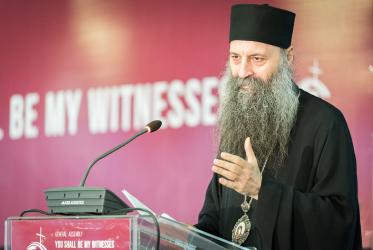The Civil Society Partnership for Development Effectiveness, Civicus, Action for Sustainable Development, Civic Initiatives and the Balkan Civil Society Development Network held a gathering in Belgrade, Serbia to discuss deteriorating conditions for civil society and attacks on human rights defenders around the world.
World Council of Churches (WCC) deputy general secretary Prof. Dr Isabel Apawo Phiri attended the meeting and, during a remembrance session, read the story of Floribert Chebeya, a human rights defender from the Democratic Republic of Congo who was killed by police in 2010. During this solemn remembrance session 1000 names of human rights defenders that have given their lives for the rights of others were presented.
On 8 April, the group issued “The Belgrade Call to Action: A Civil Society Call to Stand Together to Defend Peoples’ Voices for a Just and Sustainable World.” The call covers many of the same issues at the core of the WCC’s mission, said Phiri.
“The call recognizes the importance of the inter-connected themes in achieving Agenda 2030 -- a voice for civil society, eradicating poverty, women’s empowerment, fighting inequality, decent work, climate action and environmental justice,” said Phiri.
The statement calls for reversing the closing and shrinking space for civil society; stopping the increasing attacks on human rights defenders and the undermining of democratic participation; and renewing the prospects for an inclusive Agenda 2030 and the full realization of the Sustainable Development Goals.
“Enough is enough! Stop the relentless attacks on civil society, social leaders and human rights defenders!” states the call. “The global community is currently moving down a path that will leave hundreds of millions of people behind; real and transformative progress towards achieving the systemic changes for people and planet promised by Agenda 2030 will not be possible without a fully engaged civil society and people’s genuine participation through their organizations and communities.”
The call also notes that it is deeply troubling that more than 60% of the world’s population - 4.5 billion people living in over 90 countries - face a situation where either the conditions are closed for civil society, where civil society is highly repressed, or where civil society faces substantial legal and political obstacles.
“In these countries there is little chance for a fully engaged and mobilized civil society, which is an essential foundation for democracy, human rights safeguards, and progress on the SDGs and for a transformative Agenda 2030,” states the call.
The call noted the strengths of civil society: its diversity, rootedness in communities and territories, direct development experience, and capacities for public engagement. “The time for rhetoric and noble international statements and declarations is over,” reads the call. “The agenda is urgent, and the time to act is now.”





